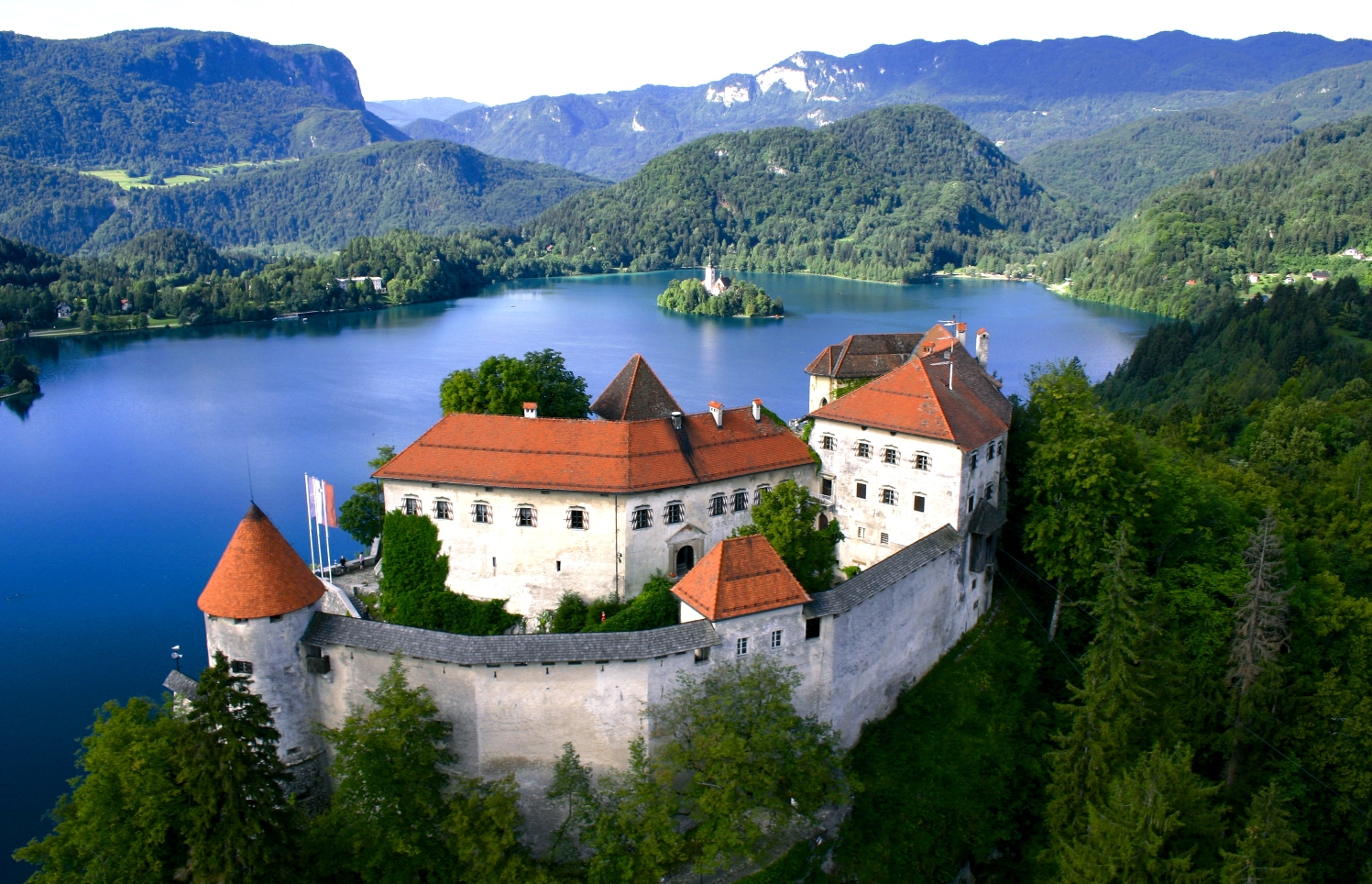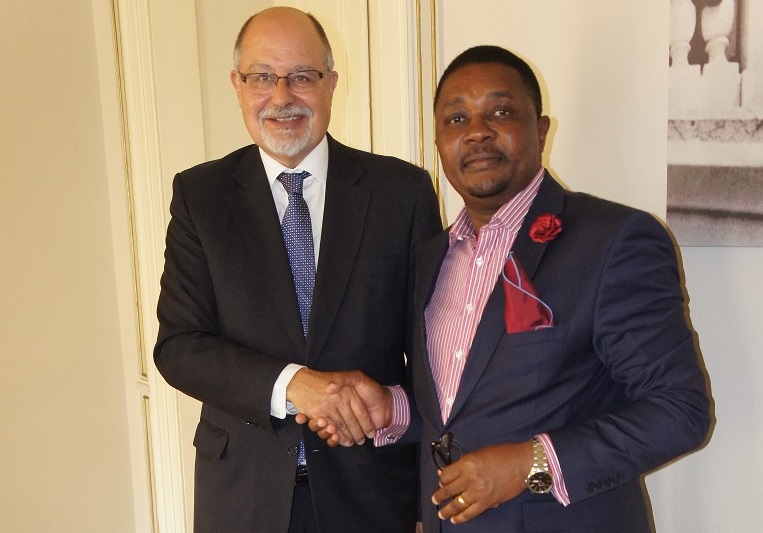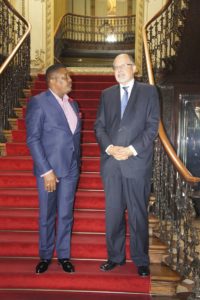

Tourism contribution to sustainable development addressed at the Bled Strategic Forum in Slovenia
“Safety, security, international cooperation and peace are key factors to ensure the sustainable development of the tourism sector,” said UNWTO Secretary-General, Taleb Rifai, at the Bled Strategic Forum, an annual meeting held in Slovenia. The occasion provided with the opportunity to present the UNWTO/World Travel & Tourism Council (WTTC) Open Letter on Travel and Tourism to Miro Cerrar, the Prime Minister of Slovenia.
The UNWTO/WTTC Open Letter calls on heads of state and government around the world to acknowledge tourism’s key role in delivering more sustained and balanced growth and prioritize the sector higher in national policies in order to maximize its potential. In the presentation of the Letter, UNWTO Secretary-General, Taleb Rifai and Gerald Lawless, Chairman of the WTTC, discussed the key factors affecting tourism development with the Slovenian Prime Minister.
“A major issue we face in our sector is that tourism is still underestimated by some leaders, particularly in its potential for job creation. My recommendation is to always include tourism in the policy agenda and consider travel facilitation as a key issue,” said UNWTO Secretary-General in the meeting with the Prime Minister.
The potential of Slovenia as a touristic destination guided the discussion and as Gerald Lawless, Chairman of WTTC, said: “Slovenia is a beautiful tourist destination. Currently, the Travel & Tourism sector contributes EUR4.9 billion to the Slovenian economy, which is 13% of the country’s GDP and supports over 13% of total employment. The Slovenian government and its people will see great further benefits from the commitment to the sustainable development of Travel & Tourism as investment in the sector will lead to higher visitor numbers and expenditure, and increased employment opportunities throughout the country”.
The contribution of tourism to the Agenda 2030 and the 17 Sustainable Development Goals (SDGs) was widely discussed in the Bled Forum. As UNWTO Secretary General stated, “it is very clear that security cannot exist without sustainability and vice versa. Indeed, tourism has never been more of an essential component of sustainable growth and stability”.
“Slovenia has become synonymous with sustainability and has also recognised the importance of cooperation in achieving sustainability and security – he mentioned – and UNWTO is convinced that in the present challenging times only by working together current concerns can be overcome and a better future is possible.”
Over the last years, the Bled Strategic Forum, has become a major incubator to debate current issues on development. In its 2016 edition the Summit has tackled tourism as a key driver for growth, job creation and environmental protection.
On the occasion, seven Slovenian companies signed the Private Sector Commitment to the Global Code of Ethics of Tourism expressing their engagement with sustainable tourism practices*.
Tourism in Slovenia
In 2015, the tourism sector in Slovenia saw a rise of 12% in the number of international tourists to reach 2.7 million. Growth was above that of Europe and the world. Revenues from exports of travel services will reach their highest level since 2008, as export growth reaches close to 10%.
Private Sector Commitment to the Global Code of Ethics
* The seven companies that signed the Global Code of Ethics in Tourism are as follows:
1 Turistična kmetija Urška
2 Hotel Park Ljubljana
3 Design rooms
4 Zavod Šouhostel
5 Kamp Koren
6 Terme Snovik – Kamnik
7 Terme Olimia
Additional information:

UNWTO candidate supported by the Portuguese speaking tourism world: Impressive!
UNWTO Secretary General Candidate Dr. Walter Mzembi may have just opened another door in his ambition to be called Secretary General of the United Nations World Tourism Organization. This time it was EU member country Portugal, and in a broader view the entire Portuguese speaking world.
The Zimbabwe’s Tourism and Hospitality Industry Minister is seeking the support by this European Union Country and voting member in the UNWTO Executive Council.
The current United Nations World Tourism Organization Secretary General, Mr Taleb Rifai, is due to stand down from the post at the end of 2017. Elections for his successor are due to take place when the Executive Council of the UNWTO meets in Madrid, Spain, in May 2017.
Zimbabwe’s Tourism and Hospitality Industry Minister, Dr Walter Mzembi, is in Lisbon, for meetings with senior government officials responsible for tourism policy and development of the tourism industry in Portugal.

“I am here to re-connect Zimbabwe and Portugal at the level of tourism. My mission is to strengthen tourism ties between Zimbabwe and Portugal and to seek to develop strong tourism-based synergies between ourselves and the broader Portuguese speaking world”.
“With our already excellent relations with both Mozambique and Angola -fellow SADC members- and our steadily burgeoning friendship with Brazil, it is only logical that we engage Portugal, a leading European nation with long-standing, historical linkages across the globe. This includes of course the African continent, and indeed also Zimbabwe.”
Shortly after arriving in the Portuguese capital Lisbon, the Minister met with Ms Ana Mendes Godhino, Secretary of State for Tourism at her offices within the Ministry of Economy headquarters building.
Emphasizing the strong historical links between Zimbabwe and Portugal, dating back to the trading days of the Munhumutapa Empire and the excellent relations which had always existed between the two countries since Zimbabwe’s independence, the Minister and the Secretary of State concurred that there was need to build further on the existing base : and that tourism was the perfect vehicle with which to pursue this joint objective.
Tourism is currently experiencing significant growth in Portugal, as security and safety concerns continue to discourage European travelers from returning to hitherto traditional holiday destinations in various parts of the world, including a number of African destinations.
Mzembi impressed his interlocutors with the breadth of his vision, his evident knowledge of and passion for the sector and the unbridled energy he brings to the table.
It was evident from the discussions and the clear chemistry of the meetings that a strong convergence of views exists between the Minister and his Portuguese hosts with regard to the role of the UNWTO and where, moving forward, the Organization should focus its attention.
Stressing the importance of tourism as an essential component of economic development and employment creation, the Minister insisted that tourism was also an effective vehicle to build bridges between peoples of different cultures and beliefs : and a key contributor, therefore, to the promotion and maintenance of global peace.
In a separate meeting with Dr Luis Manuel Patrao, National Secretary for Administration of the governing Socialist Party and a former President of the Portuguese National Tourism Board, Dr Mzembi outlined his vision for the future development of the global tourism industry under the umbrella of the UNWTO.
Paying glowing tribute to the leadership and “enormous contribution” of incumbent Secretary General, Mr Taleb Rifai, Dr Mzembi said his intention, if elected to the post, would be, “to build upon Taleb’s enduring legacy”, and to work tirelessly to ensure that the UNWTO is accorded the recognition it fully merits within the family of UN specialized agencies.
Dr Mzembi noted the expectation of UNWTO member states that, in addition to the technical advice and support provided by the Organization, it could be doing more to foster development of the tourism sector in member countries. In this regard, innovative approaches and identifying effective synergy with other, better resourced developmental agencies of the UN family could provide a workable way forward towards meeting some of those expectations.
“Given the serious challenges which confront tourism today, most specifically the threat of terrorism, which, in recent times, has deliberately targeted tourists and tourist destinations, and from which none of us is immune. It is important, if we are to effectively address that issue and to come up with effective solutions, that those major players should be at the table and participate in the search for an appropriate and effective response.”
With this remark, Mzembi stressed the importance of growing UNWTO’s membership from the current level of 157 to match that of the United Nations itself. “ We need to aim for universality of membership and to reach out to important global players who are not members of the UNWTO, countries such as the United States, the United Kingdom and Canada. They should very seriously consider joining us”.
“Hard power responses are probably unavoidable, for sure, but soft power responses, by way of tourism promotion and building understanding and tolerance between and among people, is a valid contribution to the search for a lasting solution”.
Dr Mzembi emphasized the need to broader the current definition of “security” as it relates to the tourism industry, to include issues such as natural disasters, health pandemics and the effects of climate change – which, he noted, often impacted more heavily than terror in terms of lives lost.
“I’m really impressed”, said Secretary of State Ana Mendes Godhino.
During the two meetings, a clear convergence of views emerged on the state of global tourism and on the role of the UNWTO in addressing the challenges currently confronting the industry.
Ms Godinho informed the Minister that, in 2015, tourist arrivals in Portugal are likely to surpass the 10 million mark. Tourism already accounts for 10% of national GDP, contributing some US$ 16 billion to the economy. 8% of total employment in Portugal can be accounted to the travel and tourism industry.
The Portuguese government is finalizing a second 10 year Tourism Development Plan, to run from 2017 to 2026, which is expected to see the tourism sector become an even more important player within the overall national economy.
“We in Zimbabwe can learn from Portuguese experience and expertise in the field of tourism development. And we can certainly benefit from your specialized tourism training and language training institutes”, Dr Mzembi told the Secretary of State.
Dr Mzembi praised the Portuguese community in Zimbabwe for their solidarity with the government of Zimbabwe and for their efforts to actively promote Portuguese culture, art, music and cuisine within Zimbabwe.
“We want to work more closely with the community in Zimbabwe in their activities as an important component of our efforts to strengthen relations with Portugal and with the wider lusophone world”, said Dr Mzembi.
The Ministers agreed to expedite the finalization and signature of a bilateral Memorandum of Cooperation to give practical effect to their common determination to deepen cooperation between the two countries in the tourism sector.
From Lisbon, Dr Mzembi flies to France – another key member of the UNWTO Executive Council – for meetings with senior tourism officials of the French government.
